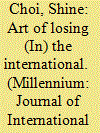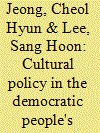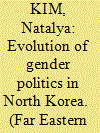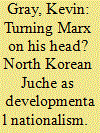| Srl | Item |
| 1 |
ID:
152112


|
|
|
|
|
| Summary/Abstract |
North Korea is an illustrative limit case for exploring contributions of an aesthetic approach to ‘decentering’ IR and taking seriously non-Western subject positions and agencies.1 North Korea is an international problem of human rights, poverty and security that sits across an enemy line, a line where empathy ends and the terrible begins. There are good reasons to condemn, hate and close down our ability to imagine subject positions – the source of life – across this enemy line. Here we can point to its notorious labour reeducation camps and frequent political purges and executions.
|
|
|
|
|
|
|
|
|
|
|
|
|
|
|
|
| 2 |
ID:
092611


|
|
|
|
|
| Publication |
2009.
|
| Summary/Abstract |
The purpose of this paper is to introduce North Korean culture as well as its foundation, North Korean cultural policy. The paper consists of three broad sections. First, I explore the unique qualities and changes of North Korean cultural policy. Next, I look into what North Korea considers to be culture and how it is portrayed. Finally, I will analyze the similarities and differences between North and South Korean cultural policy, and the possibility of their convergence.
|
|
|
|
|
|
|
|
|
|
|
|
|
|
|
|
| 3 |
ID:
162797


|
|
|
|
|
| Summary/Abstract |
Broader rights and greater opportunities granted to Korean women have been priorities in social policy of North Korea. The liberation of Korea from colonial dependence presented the country's leadership with the task of doing away with semi-feudal holdovers, one of which was female discrimination in family and public life. Equality of the sexes was based on the socialist concept of women's emancipation. After the establishment of juche as the state's ideology in North Korea, the development of rights and duties of women has received a new ideological backing largely based on traditional Korean values.
|
|
|
|
|
|
|
|
|
|
|
|
|
|
|
|
| 4 |
ID:
095757


|
|
|
|
|
| Publication |
2010.
|
| Summary/Abstract |
This paper reviews North Korea's economic reforms and their effects on trade and foreign direct investment and examines whether North Korea can be as successful as Vietnam in its pursuit for economic growth. This study finds that various institutional barriers prevent North Korea from becoming the next Vietnam. Given North Korea's current politico-economic situation, the North Korean regime may not yet be ready to remove such institutional constraints.
|
|
|
|
|
|
|
|
|
|
|
|
|
|
|
|
| 5 |
ID:
106323


|
|
|
|
|
| Publication |
2011.
|
| Summary/Abstract |
North Korea has a powerful national narrative which is based on struggle against external forces. Since the mid-nineties, this has been centered on sacrifice for the sake of military strength. Recently, however, this narrative arc has been shifted: Now the people are to be rewarded by the central government for years of sacrifice with improvement to quality of life. The 2009 currency reform, rather than simply a failure, was an integral part of the strategy to deliver this improvement by 2012. China's continued support for Pyongyang's plans to develop infrastructure and expand trade, combined with the national narrative, gives this development plan a reasonable chance to succeed.
|
|
|
|
|
|
|
|
|
|
|
|
|
|
|
|
| 6 |
ID:
090094


|
|
|
|
|
| Publication |
2009.
|
| Summary/Abstract |
North Korea is a socialist "dynasty" shrouded in secrecy. The regime's inconsistencies leave even the best of North Korean specialists and commentators befuddled as the country's actions invalidate their predictions. One must, however, understand North Korea's sociopolitical ideology in order to appreciate its inconsistencies as a regime. This paper will discuss the impact of North Korea's ideology in historical and sociopolitical context, as well as show the depth of ideological penetration into every layer of its society. The Juche ideology that has characterized the regime is a peculiar combination of nationalism, Marxism, and Confucianism. Since Kim Il-Sung's death, however, and the succession to power of his son, Kim Jong-Il, North Korea's ideology has metamorphosed into a series of sub-ideologies. The purpose of this paper is to elaborate on the process by which North Korean ideology changed and the paradox between the rise in ideological rhetoric and the weakening legitimacy of the regime under Kim Jong-Il.
|
|
|
|
|
|
|
|
|
|
|
|
|
|
|
|
| 7 |
ID:
156634


|
|
|
| 8 |
ID:
078643


|
|
|
|
|
| Publication |
2007.
|
| Summary/Abstract |
In order to better understand and explain North Korea's foreign policy strategies and tactics on the controversy surrounding the nuclear program, this chapter examines the perceptions held by Pyongyang about the neighbouring counties including the United States, Japan, and South Korea. These perceptions are formulated in accordance with North Korea's perception about itself that is generally constructed based on the principle of Juche (self-reliance) and the political and security environment surrounding the Korean peninsula as perceived by Pyongyang itself. North Korea is an unconventional country if one looks from outside but it is not irrational in that it has pursued its own national interest rather effectively for which security is first and foremost. This chapter provides an explanation of North Korean conducts from the perspective of North Korea's own mind-set.
|
|
|
|
|
|
|
|
|
|
|
|
|
|
|
|
| 9 |
ID:
190797


|
|
|
|
|
| Summary/Abstract |
The existing literature on North Korea has been divided over whether the country’s state ideology of Juche should be regarded as a variant of Soviet Marxism-Leninism or whether the explicit voluntarism of Juche means that it should be viewed as a distinctive indigenous ideology. Drawing on Trotsky’s theory of uneven and combined development and Gramsci’s theory of ideology, the paper argues that North Korea’s status as a geopolitically insecure postcolonial country engaged in a forced march from “backwardness” to a modern industrialized economy has had a decisive impact on both the form and content of North Korean state ideology. Understood as a form of developmental nationalism that seeks not only to legitimize authoritarian rule but also to create a collective subjectivity suited the task of rapid catch-up national development, Juche constitutes a combined ideological form that rests on Marxist-Leninist origins but has deliberately drawn on existing forms of “common sense” conducive towards the mass mobilization of society. In doing so, this paper critically engages with the argument that the voluntarism of Juche represents a decisive break from the supposedly objective laws of Marxism and Marxism-Leninism, thereby “turning Marx on his head.”
|
|
|
|
|
|
|
|
|
|
|
|
|
|
|
|